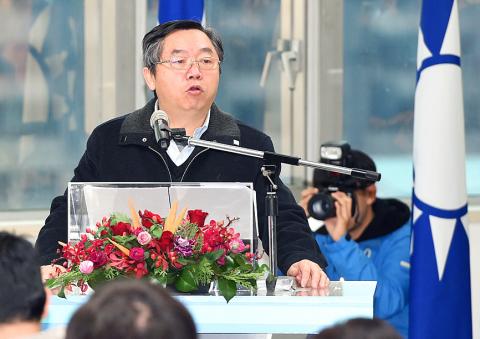The Chinese Nationalist Party (KMT) yesterday said it is considering collecting a “special party fee” and raising the contribution amounts required by KMT cadres and public office holders, in a last-ditch effort to remedy what the party called an “unprecedented financial crisis.”
“The challenge facing the KMT is unprecedented, as is its current financial crisis. To make matters worse, the passage of the Political Party Act (政黨法) last month significantly restricted the engagement of political parties in profit-making activities,” KMT Administration and Management Committee director Chiu Da-chan (邱大展) said in his report on the party’s financial situation at a meeting of the KMT Central Committee in Taipei yesterday.
It was the first meeting of the 210 members of the Central Committee since they were elected in September.

Photo: Liao Chen-huei, Taipei Times
To keep from being dependent on borrowed money, the party plans to levy a “special party fee” on party members and require KMT cadres and public officials to contribute more to the party, Chiu said.
“We are still discussing what a reasonable amount would be for local office holders to contribute and we will let everyone know once we decide,” Chiu said.
In November last year, then-KMT chairwoman Hung Hsiu-chu (洪秀柱) passed a regulation that stipulated the amount that each high-level party member would need to raise annually. The regulation was an attempt to alleviate the party’s financial straits amid ongoing efforts by the Ill-gotten Party Assets Settlement Committee to recover party assets allegedly acquired illegally during the nation’s authoritarian era.
The regulation requires the KMT chairperson and vice chairs to each raise NT$10 million, while special municipality mayors must raise NT$2 million and party lawmakers NT$500,000.
According to Chiu, KMT Chairman Wu Den-yih (吳敦義) has borrowed NT$140 million since he assumed the chairmanship to pay the party’s monthly administrative and personnel expenditures, which total NT$30 million.
“There are hidden liabilities,” Chiu said, citing the party’s downsizing plan in January, which includes 719 laid-off staff receiving a total of NT$970 million in severance pay and pensions, and pension payments to retired staff, an amount to be decided in an ongoing negotiation.
Meanwhile, the KMT has only NT$10.1 million in disposable cash in its bank accounts, Chiu said, as NT$10.5 million of the party’s savings have been frozen.
The Chang Yung-fa Foundation has also yet to pay NT$100 million owed to the party for the company’s acquisition of the former KMT headquarters in Taipei’s Zhongzheng District (中正) in 2006, Chiu added.
Despite allegations that the party possesses overseas assets worth hundreds of billions of New Taiwan dollars, the KMT only owns real estate with a combined worth of NT$2 billion, including land measuring 33,000m2 and buildings with more than 50,000m2 in floor space, Chiu said.
“Although Central Investment Co (中投資產) is owned by the KMT and has NT$34.8 billion in assets, its net worth, after excluding liabilities, is only NT$15.3 billion — and that money has all been frozen,” he said.
The Ill-gotten Party Assets Settlement Committee in November last year ruled that Central Investment Co was a KMT-affiliated organization and prohibited it from disposing of its assets.

Taiwanese can file complaints with the Tourism Administration to report travel agencies if their activities caused termination of a person’s citizenship, Mainland Affairs Council Minister Chiu Chui-cheng (邱垂正) said yesterday, after a podcaster highlighted a case in which a person’s citizenship was canceled for receiving a single-use Chinese passport to enter Russia. The council is aware of incidents in which people who signed up through Chinese travel agencies for tours of Russia were told they could obtain Russian visas and fast-track border clearance, Chiu told reporters on the sidelines of an event in Taipei. However, the travel agencies actually applied

Japanese footwear brand Onitsuka Tiger today issued a public apology and said it has suspended an employee amid allegations that the staff member discriminated against a Vietnamese customer at its Taipei 101 store. Posting on the social media platform Threads yesterday, a user said that an employee at the store said that “those shoes are very expensive” when her friend, who is a migrant worker from Vietnam, asked for assistance. The employee then ignored her until she asked again, to which she replied: "We don't have a size 37." The post had amassed nearly 26,000 likes and 916 comments as of this

New measures aimed at making Taiwan more attractive to foreign professionals came into effect this month, the National Development Council said yesterday. Among the changes, international students at Taiwanese universities would be able to work in Taiwan without a work permit in the two years after they graduate, explainer materials provided by the council said. In addition, foreign nationals who graduated from one of the world’s top 200 universities within the past five years can also apply for a two-year open work permit. Previously, those graduates would have needed to apply for a work permit using point-based criteria or have a Taiwanese company

The Shilin District Prosecutors’ Office yesterday indicted two Taiwanese and issued a wanted notice for Pete Liu (劉作虎), founder of Shenzhen-based smartphone manufacturer OnePlus Technology Co (萬普拉斯科技), for allegedly contravening the Act Governing Relations Between the People of the Taiwan Area and the Mainland Area (臺灣地區與大陸地區人民關係條例) by poaching 70 engineers in Taiwan. Liu allegedly traveled to Taiwan at the end of 2014 and met with a Taiwanese man surnamed Lin (林) to discuss establishing a mobile software research and development (R&D) team in Taiwan, prosecutors said. Without approval from the government, Lin, following Liu’s instructions, recruited more than 70 software